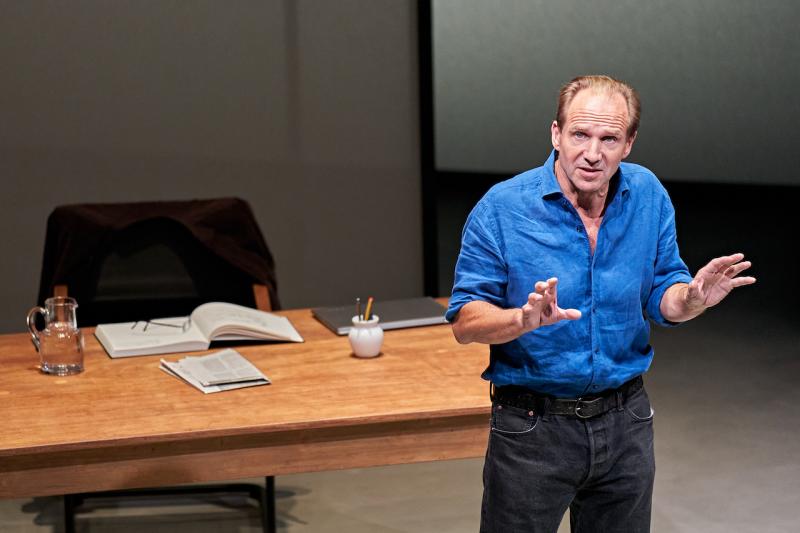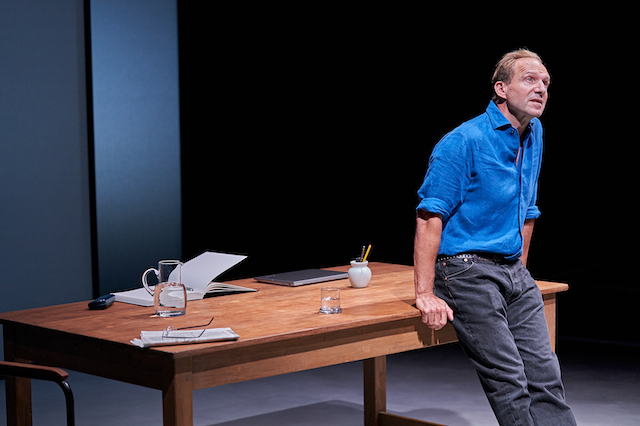Beat the Devil, Bridge Theatre review – Ralph Fiennes delivers an arresting account of Covid-19 | reviews, news & interviews
Beat the Devil, Bridge Theatre review – Ralph Fiennes delivers an arresting account of Covid-19
Beat the Devil, Bridge Theatre review – Ralph Fiennes delivers an arresting account of Covid-19
Theatre itself become an act of rebellion against the microbe

For a riveting, cathartic – and often surprisingly humorous – 50 minutes Ralph Fiennes paces the stage at the Bridge Theatre to deliver an account of Covid-19 that is as political as it is personal.
The fact that it now feels quite so radical to be sitting in an auditorium, which once seated 900 but has been reconfigured for 250, is just one indication that the metaphor functions as powerfully politically as it does physically. Theatre here has become an act of rebellion against a microbe we are all still struggling to understand. In staging and directing Beat the Devil as the first in a season of monologues, London Theatre Company co-director Nicholas Hytner demonstrates once more his deft understanding of how theatre can strike the heart of what makes society function.
Here it’s the profound need to talk together about what – if any – control we can exert over a disease that Hare describes at another point as "a swallowed Catherine Wheel". In his 2003 verbatim play The Permanent Way, Hare stitched together telling details from witnesses to deliver a potent attack on Britain’s railways: now he himself is the frontline witness to a very different political disaster story.
On a stage with only a desk and chair as props, Fiennes – who will appear once more as M in this autumn’s delayed Bond – describes a harrowing gallimaufry of symptoms. "Everything tastes of sewage," he exclaims. It begins gently as "a Platonic illness" with "lots of black and white movies in the afternoon", and as it progresses he wakes in a "lake of sweat" from a 40 degree temperature, endures days of vomiting and even contracts herpes. His personal account is amplified by broader observations about the terrifying challenges experienced by medical experts; a professor of thrombosis tells him "she’s seeing the stickiest blood of her career". There’s a moment during his sickness when he reaches "total despair", though he injects some levity by mentioning that his wife [Nicole Farhi] "is horrified because I am the colour of Bela Lugosi".
 If Hare’s overtly political observations carry less punch, it’s merely because the juddering farce of Tory incompetence (shown not least in this weekend’s poll revealing Johnson’s squandering of his lead over Labour) means we’re familiar with the arguments. Still, the endurance of post-shame politics means it remains important to continue to detail the dangerous mixing of political arrogance with ineptitude: the inadequacy of test and trace, the care homes scandal, the frequently inadequate protection of frontline staff.
If Hare’s overtly political observations carry less punch, it’s merely because the juddering farce of Tory incompetence (shown not least in this weekend’s poll revealing Johnson’s squandering of his lead over Labour) means we’re familiar with the arguments. Still, the endurance of post-shame politics means it remains important to continue to detail the dangerous mixing of political arrogance with ineptitude: the inadequacy of test and trace, the care homes scandal, the frequently inadequate protection of frontline staff.
Hare talks too about swaggering populist attempts to shape attitudes to the disease in both Britain and the US. Whether it’s Trump’s dismissal of "losers" taking it seriously, or right-wing journalistic hollering that the pandemic is some kind of war to be won or lost, it's part of the horror that even after hundreds of thousands of deaths, the catastrophic consequences of cavalier language can be seen not least in events like the anti-lockdown demonstration in Trafalgar Square this weekend.
Yet for all his rage and eloquence, the most powerful point in the evening comes when he makes a simple and almost primal appeal for "Truth". Referencing other profoundly divisive political events ranging from Bloody Sunday to the Grenfell Tower disaster, he declares movingly that ultimately it is truth that has proved to be the only way to address and heal such levels of disaster. At the moment that Fiennes says the word, the atmosphere in the theatre changes and it’s possible to hear the whole auditorium breathing more quietly. In our apparently post-truth age, it is at that moment you remember how important it is to be with others in a room again.
rating
Explore topics
Share this article
The future of Arts Journalism
You can stop theartsdesk.com closing!
We urgently need financing to survive. Our fundraising drive has thus far raised £49,000 but we need to reach £100,000 or we will be forced to close. Please contribute here: https://gofund.me/c3f6033d
And if you can forward this information to anyone who might assist, we’d be grateful.

Subscribe to theartsdesk.com
Thank you for continuing to read our work on theartsdesk.com. For unlimited access to every article in its entirety, including our archive of more than 15,000 pieces, we're asking for £5 per month or £40 per year. We feel it's a very good deal, and hope you do too.
To take a subscription now simply click here.
And if you're looking for that extra gift for a friend or family member, why not treat them to a theartsdesk.com gift subscription?
more Theatre
 Born with Teeth, Wyndham's Theatre review - electric sparring match between Shakespeare and Marlowe
Rival Elizabethan playwrights in an up-to-the-minute encounter
Born with Teeth, Wyndham's Theatre review - electric sparring match between Shakespeare and Marlowe
Rival Elizabethan playwrights in an up-to-the-minute encounter
 Interview, Riverside Studios review - old media vs new in sparky scrap between generations
Robert Sean Leonard and Paten Hughes make worthy sparring partners
Interview, Riverside Studios review - old media vs new in sparky scrap between generations
Robert Sean Leonard and Paten Hughes make worthy sparring partners
 Fat Ham, RSC, Stratford review - it's Hamlet Jim, but not as we know it
An entertaining, positive and contemporary blast!
Fat Ham, RSC, Stratford review - it's Hamlet Jim, but not as we know it
An entertaining, positive and contemporary blast!
 Juniper Blood, Donmar Warehouse review - where ideas and ideals rule the roost
Mike Bartlett’s new state-of-the-agricultural-nation play is beautifully performed
Juniper Blood, Donmar Warehouse review - where ideas and ideals rule the roost
Mike Bartlett’s new state-of-the-agricultural-nation play is beautifully performed
 The Gathered Leaves, Park Theatre review - dated script lifted by nuanced characterisation
The actors skilfully evoke the claustrophobia of family members trying to fake togetherness
The Gathered Leaves, Park Theatre review - dated script lifted by nuanced characterisation
The actors skilfully evoke the claustrophobia of family members trying to fake togetherness
 As You Like It: A Radical Retelling, Edinburgh International Festival 2025 review - breathtakingly audacious, deeply shocking
A cunning ruse leaves audiences facing their own privilege and complicity in Cliff Cardinal's bold theatrical creation
As You Like It: A Radical Retelling, Edinburgh International Festival 2025 review - breathtakingly audacious, deeply shocking
A cunning ruse leaves audiences facing their own privilege and complicity in Cliff Cardinal's bold theatrical creation
 Edinburgh Fringe 2025 reviews: Refuse / Terry's / Sugar
A Ukrainian bin man, an unseen used car dealer and every daddy's dream twink in three contrasting Fringe shows
Edinburgh Fringe 2025 reviews: Refuse / Terry's / Sugar
A Ukrainian bin man, an unseen used car dealer and every daddy's dream twink in three contrasting Fringe shows
 Faustus in Africa!, Edinburgh International Festival 2025 review - deeply flawed
Bringing the Faust legend to comment on colonialism produces bewildering results
Faustus in Africa!, Edinburgh International Festival 2025 review - deeply flawed
Bringing the Faust legend to comment on colonialism produces bewildering results
 Edinburgh Fringe 2025 reviews: Imprints / Courier
A slippery show about memory and a rug-pulling Deliveroo comedy in the latest from the Edinburgh Fringe
Edinburgh Fringe 2025 reviews: Imprints / Courier
A slippery show about memory and a rug-pulling Deliveroo comedy in the latest from the Edinburgh Fringe
 Edinburgh Fringe 2025 reviews: The Ode Islands / Delusions and Grandeur / Shame Show
Experimental digital performance art, classical insights and gay shame in three strong Fringe shows
Edinburgh Fringe 2025 reviews: The Ode Islands / Delusions and Grandeur / Shame Show
Experimental digital performance art, classical insights and gay shame in three strong Fringe shows
 Edinburgh Fringe 2025 reviews: Ordinary Decent Criminal / Insiders
Two dramas on prison life offer contrasting perspectives but a similar sense of compassion
Edinburgh Fringe 2025 reviews: Ordinary Decent Criminal / Insiders
Two dramas on prison life offer contrasting perspectives but a similar sense of compassion
 Edinburgh Fringe 2025 reviews: Kinder / Shunga Alert / Clean Your Plate!
From drag to Japanese erotica via a French cookery show, three of the Fringe's more unusual offerings
Edinburgh Fringe 2025 reviews: Kinder / Shunga Alert / Clean Your Plate!
From drag to Japanese erotica via a French cookery show, three of the Fringe's more unusual offerings

Add comment